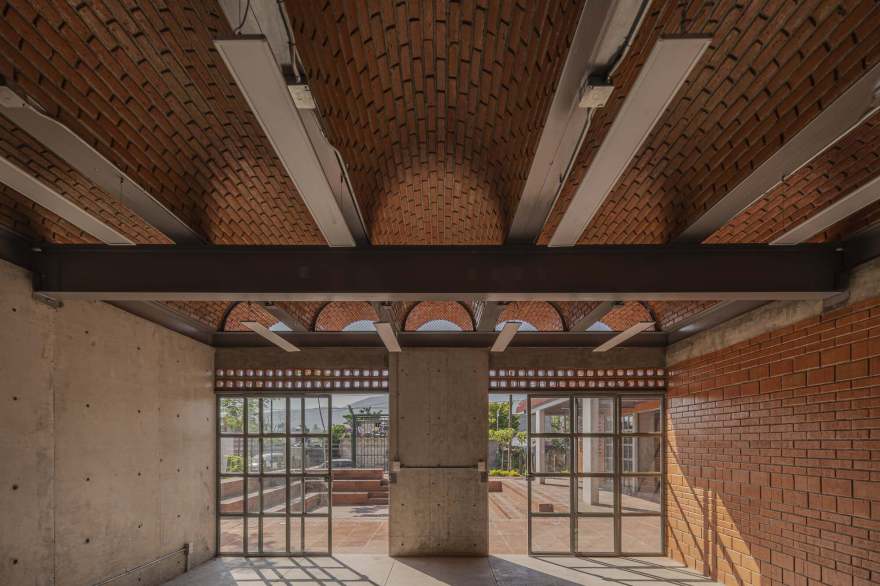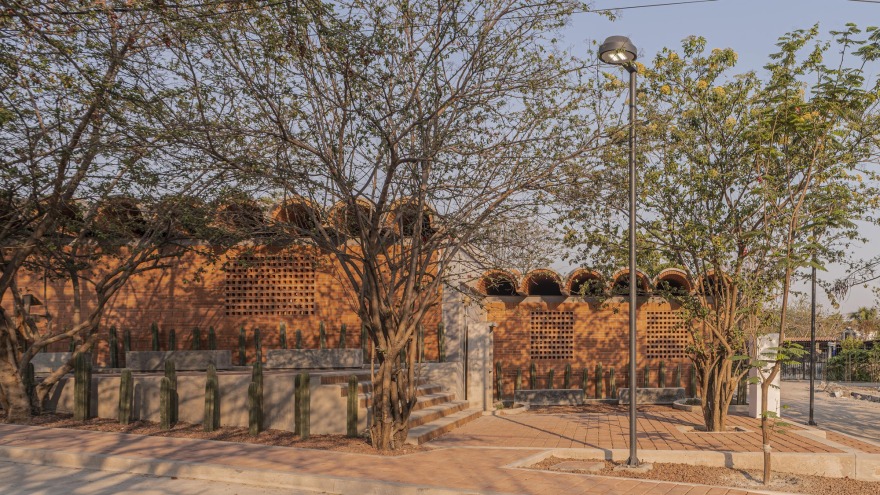查看完整案例

收藏

下载

翻译
Architects:Taller CD
Area:910m²
Year:2022
Photographs:Andrés Cedillo
Manufacturers:Cemex,Helvex,MACERE México,Novaceramic
Architect In Charge:Alberto Cejudo Núñez
Project Team:Jocelyn Gutiérrez Miranda, Mariana Rodriguez Monroy, Lilian Muciño Juárez, Estephani Flores Vázquez, Alexandra López Arellanos, Diana Carolina Peralta Moreno
Promoter:SEDATU
Construction :UPEDU
City:Tlatenchi
Country:Mexico
Text description provided by the architects. The House of Culture and the Children's Garden (CADI) Tlatenchi represent two projects developed jointly, although in separate premises commonly called "residual lots". When addressing the creation of public spaces, it is crucial to maximize their potential beyond established limits and, in this particular case, focus on generating intersections, concentration, and meaning.
Tlatenchi is a community belonging to the municipality of Jojutla in Morelos, in this location both projects integrate into a housing context, so one of the design premises was to maintain coherence between them, given that, although they are only a 5-minute walk from each other, they lack a direct physical connection.
For this reason, integration of the landscape and structures was sought through the use of uniform materials in terms of color, arrangement, and structural solutions through a system of Catalan vaults, allowing both to be perceived as a single entity.
In both cases, the natural flows that residents used to have between one street and another were considered, which involved the reintroduction of the original street formed by the previous use road, the natural crossing. The concentration of individuals in these spaces generated a nodal point in each center, which translated into an auditorium in the House of Culture and a patio in the case of CADI.
Reviving the vault - Meaning. A key element was the contemporary incorporation of the brick vault, which in modern architecture allows for the use of its structural functionality, versatility, and expressiveness. This approach implied a review of the craftsman's trade who builds it, whose knowledge has been passed down from generation to generation in Tlatenchi, as well as the integration of materials with the particular dimensions of the site and the era in which it is located.
This system, which local artisans master effectively, was implemented to cover large spaces without the need for intermediate supports and to improve air circulation inside the spaces.
Given the knowledge of seismic susceptibility in the Jojutla region, a reinterpretation of the Catalan vault was chosen with the main purpose of avoiding the self-construction of multiple levels without the appropriate structural knowledge, to prevent tragedies like the one that occurred in the 2017 earthquake, where the lack of planning and misguided construction caused damage or collapse of thousands of buildings.
In construction terms, the exposed load-bearing walls serve as the basis of the structural system. These walls were created using extruded brick, while mud brick was reserved for the vaults. The materials extend to the courtyards, stairs, and walkways, paved with well-known clay tiles.
In addition, the area experiences a predominantly warm and humid climate for much of the year, so the selection of materials in architectural design plays a key role in the thermal regulation of spaces.
This is especially important in public buildings that require little maintenance and where the option of air conditioning may not be feasible. Therefore, lattices and openings were incorporated to allow cross-ventilation to regulate temperature. Each of these elements contributed to the coherence between the two plots as a whole.
The authentic public space arises from genuine citizen participation, which gives rise to essential presences and forces that transform these spaces into environments of encounter and active participation beyond physical structures. This vision allows them to be perceived as the central component of a surrounding sphere of activity.
Project gallery
Project location
Address:62907 Tlatenchi, Mor., Mexico
客服
消息
收藏
下载
最近

























